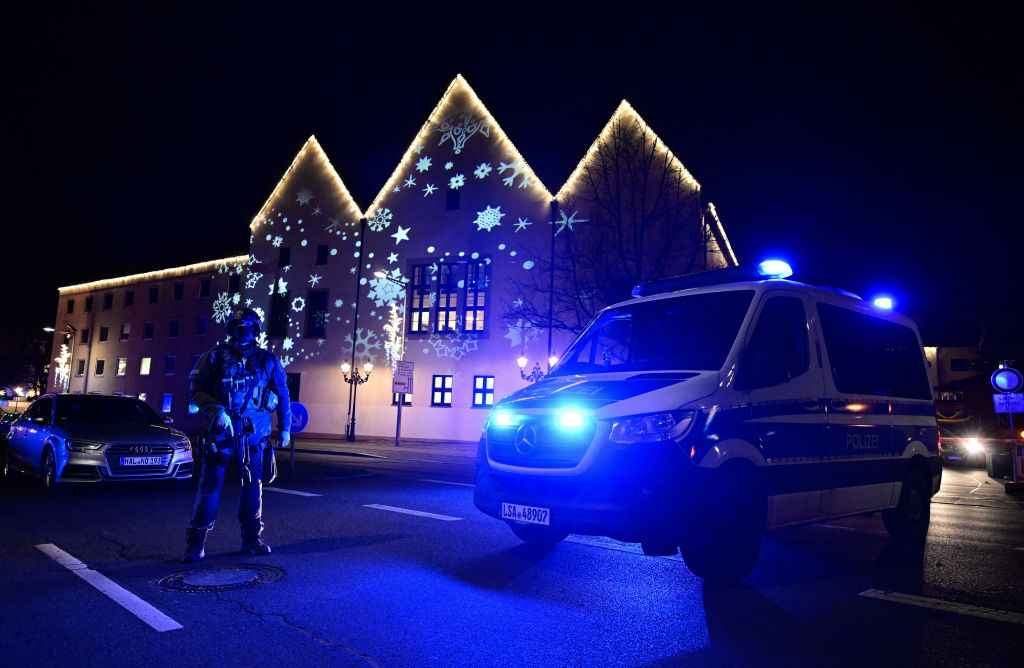In such polarised times, there is a strong temptation to interpret acts of violence through the lens of one’s own biases. The attack on a Christmas market in the German city of Magdeburg yesterday evening, which killed five and injured over 200 more, has revealed this impulse in the starkest terms. Already, attention has been drawn from the Right to the background of the alleged perpetrator as an asylum seeker from Saudi Arabia, and from some on the Left to his support of Alternative for Germany (AfD).
Importantly, the main suspect, a 50-year-old Saudi national and psychotherapist named Taleb al-Abdulmohsen, was less a “lone wolf” than a “known wolf”. Not only did Saudi authorities repeatedly warn their German counterparts that he was posting online about his desire to kill civilians, Abdulmohsen had also contacted prominent ex-Muslims such as Yasmine Mohammed and Ali Utlu. Both Mohammed and Utlu suspected he was a Saudi agent spying on ex-Muslims and dissidents, with the latter claiming today: “He acted ex-Muslim on the outside, while in direct messages he threatened ex-Muslims, especially Saudi women who had fled.”
Abdulmohsen also contacted the German-Egyptian writer Hamed Abdel-Samad, one of the country’s most prominent critics of Islam, demanding that Abdel-Samad distance himself from a secular group which supports refugees as he was planning to do something which would make the organisation “the talk of the world”. Over a year ago, a Saudi woman sought to alert authorities that Abdulmohsen wanted to “kill […] 20 German people” because he felt he had been treated unfairly by police in a separate case. Unfortunately, she sent the email to a police station in Berlin, New Jersey instead of the German capital.
Reacting to Friday evening’s attack, some journalists described Abdulmohsen as an activist who opposed the Saudi government, supported women’s rights, provided aid for refugees and was an atheist. Yet people who interacted with him on social media argued that, rather than supporting women, he deliberately targeted female ex-Muslims who had fled Saudi Arabia with the purpose of exposing them.
Additional reporting by the German weekly Der Spiegel stated that the suspect sympathised with the AfD, Elon Musk, and British anti-Islam activist Tommy Robinson, with the article arguing an “Islamist background can almost certainly be excluded”. Abdulmohsen also reportedly had plans to create an academy for ex-Muslims together with the AfD. But there has not been a good explanation as to why an atheistic former Muslim would target families at a Christmas market eight years, almost to the day, after a similar incident happened in Berlin.
It is also unclear why German authorities did not act on the information coming from Saudi Arabia. A country which calls the police on citizens who label prominent politicians “idiots” evidently did not see the need to investigate someone who spoke openly about his intention to kill Germans. Additionally, apart from the accusations that Abdulmohsen was a spy rather than a dissident, much attention has been paid to the concept of Taqiyya, supposedly a doctrine used by Islamists allowing them to deny their religion in order to deceive others and achieve their goals by stealth.
Evidence is still being collected, and while the Magdeburg attack might not fit the usual pattern of an Islamist terror attack, it also doesn’t match the behaviour of a Right-wing extremist. Could Abdulmohsen have been a Saudi agent gone rogue? Or was his violence the product of a mental breakdown rather than a twisted ideology?
Whatever the truth, this incident will have wider ramifications across Germany. In one of the oldest Christian countries in the world, families can no longer safely visit a Christmas market; once there, they must pass through detectors similar to airport security. The German people will demand accountability, and the emerging narrative that Adbulmohsen was radicalised by the AfD and Elon Musk is unlikely to convince them.











Join the discussion
Join like minded readers that support our journalism by becoming a paid subscriber
To join the discussion in the comments, become a paid subscriber.
Join like minded readers that support our journalism, read unlimited articles and enjoy other subscriber-only benefits.
Subscribe